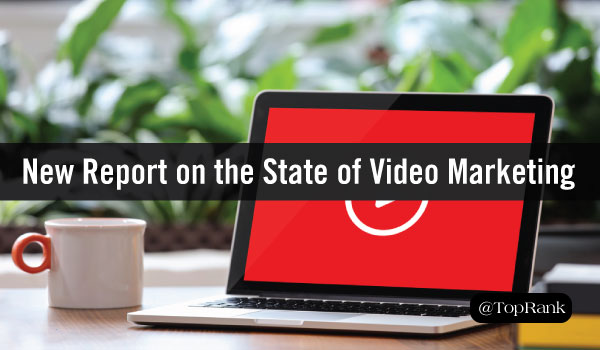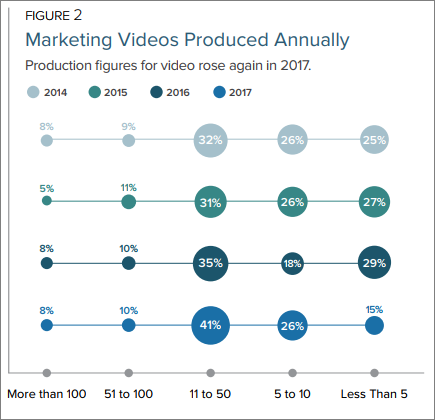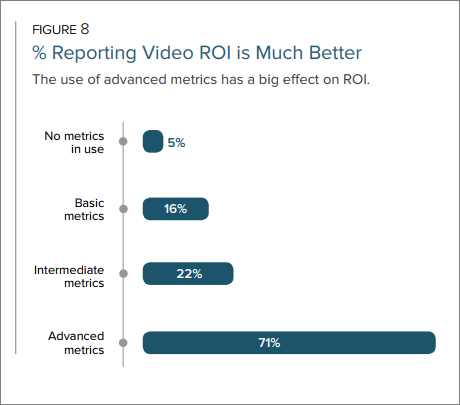
These days, there’s little doubt among marketers that video content is an incredibly powerful content marketing tool. After all, humans are visual creatures by nature, so it stands to reason that video often satisfies our content appetite. In fact, according to a Think With Google study, 50% of internet users said they’ve looked for videos related to a product or service before visiting a store.
But as more brands and marketers jump on the video content marketing bandwagon, it’s more important than ever to examine your strategy to ensure you’re getting the most out of your efforts. And a great starting point is to get the lay of the current video marketing land and emerging trends.
Thankfully, Demand Metric and Vidyard recently published the 2017 Video Content Marketing Benchmark Study, featuring data and insights collected from marketers at B2B or mixed B2B/B2C companies—all of which reported revenue growth in the previous fiscal year, as well as using video to some degree.
Below I highlight some of the findings that I found most interesting, as well as what that means for you as you begin or refine your video marketing efforts.
1. Video marketing usage is not only on the rise, but the amount of video being created is growing rapidly.
According to the study, for the fourth consecutive year, over 90% of study participants reported that video is becoming more important to their efforts. But what’s more, the average number of videos being produced annually jumped from around 29 in 2016 to 38 in 2017.

Of course, smaller companies are producing less video than big companies, but the gap is narrowing. For example, 2016 numbers showed that more than one-third of small companies were producing less than five videos every year. But in 2017 that number shrunk to just one-fifth.
What does this mean for marketers? While video seemed like the answer to overcoming content overload and capturing audience attention, the competition for creating high-quality, engaging and compelling video is growing. So, it’s more critical than ever to make sure you’re not just “doing” video, but that it’s a strategic and thoughtful piece of your overall content marketing mix.
It’s more critical than ever to make sure you’re not just “doing” #video. @CaitlinMBurgess Share on X2. The types of video marketers are investing in are expanding.
Product, demos and explainer videos lead the pack in terms of the most common types of videos being created, which isn’t a surprise. This type of content highlights a company’s product or service offerings, and expertise in a visual way. However, more forms of video such as how-tos, live streams, social media and those focused on company culture are becoming more widely used.
What does this mean for marketers? To me, this signals that video can and does enhance the customer journey at every stage of the funnel. Just as you craft written content to satisfy your audience’s quest for knowledge at different stages, video can be used in the same way. Furthermore, it can be used to achieve a variety of different marketing objectives such as recruiting new talent, humanizing your brand or sparking real-time engagement.
Video can & does enhance the customer journey at every stage. #videomarketing Share on X3. Video can inform, engage and convert.
Video, both produced and native, has long-been dubbed as a great way to inform and engage your audience. Studies have shown that we spend a huge chunk of our online time watching video, often multiple times a day. (My personal favorite are all those Tasty videos of recipes I’ll probably never make.)
But if you’ve been skeptical on the conversion power of video, don’t be. According to the report, roughly 70% of participants said video converts better than other forms of content.

What does this mean for marketers? Building off my point in the previous section, if you really want to commit to video and drive the ultimate objective of getting conversions, you should aim to create relevant, quality video content for every level of buyer’s journey.
70% of marketers say #video converts better than other content forms. @DemandMetric @vidyard Share on X4. Advanced measurement is key to unlocking the best ROI.
As with any marketing initiative, measurement is critical to understanding how you’re performing and uncovering opportunities for improvement. However, most marketers are just tracking and analyzing the basics such as views or shares—making it difficult to map video to ROI.
According to the report, just 13% of respondents said they’re using advanced metrics such as views by embed location, viewer drop-off rates, heat maps and attribution to sales pipeline. However, of that 13%, 71% say that these metrics help report much better on video ROI.
“A true and accurate measurement of the ROI of video (or any type of content) requires the adoption and use of advanced metrics,” the report states. “When advanced metrics are not in use, ROI determination is an estimate at best. When advanced metrics are in use, marketers have the information they need about video content performance to achieve even better results.”
What does this mean for marketers? Marketers are often looked at as the spenders within an organization. And while video can no longer be considered a “rising” trend, it can still be hard to get buy-in and more budget if you can’t prove its value. According to the report: “The best way to capture and exploit advanced metrics is to integrate video viewing data into Marketing Automation and/or CRM systems.”
Advanced #videomarketing metrics are key to achieving better results. @DemandMetric @vidyard Share on XLooking for Video Content Marketing Best Practices & Tips?
Check out these helpful resources on the TopRank Marketing blog:
- How to Get Started with Video Content (Without a Blockbuster Budget)
- How 7 Brands Connect with Audiences Through Long-Form Video Content
- Going Native: Tips & Examples for Effectively Incorporating Native Video Into Your Social Strategy
In addition, if you want more on the state of video marketing, read the full report here.


